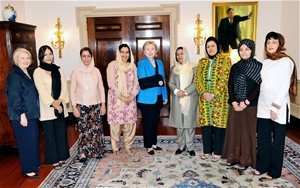
The Afghan delegation meets with Secretary of State Hillary Clinton (center) and Ambassador-at-Large for Global Women’s Issues Melanne Verveer (far left).
USAID/CDP
Six female ministerial staff form the Women’s Leadership Caucus after training in the United States.
19 OCTOBER 2009 | KABUL, AFGHANISTAN
Long excluded from participation in public life, Afghan women have a great deal to offer their country. Their untapped energy and productivity are essential for sustainable peace, security, and development. Now, with support from the U.S. Government, Afghan women professionals are beginning to come together and promote their needs and abilities publically.
Recently, six female Afghan ministerial staff established a forum to promote women’s issues and encourage women’s leadership at the government level. They launched the Women’s Leadership Caucus (WLC) after attending a week-long U.S.-funded leadership and management training course in Washington, D.C. The new group will work to overcome barriers limiting women’s contributions to their country’s economic and political development.
The WLC, whose emphasis is professional rather than political, aims to increase women’s levels of responsibility within the Afghan government. Consisting of 15 members from different ministries, the Caucus will build alliances and support the implementation of training programs for women. In addition, the WLC will work towards the full implementation of the National Action Plan for the Women of Afghanistan and the Civil Service Commission Gender Policy. Ultimately, the group aims to increase the percentage of female civil servants in Afghanistan to 30 percent over the next five years – up from zero percent in 2002.
The training that led to the WLC’s formation also provided the opportunity to learn about leadership, including how to develop an effective leadership style in a challenging environment. The women, who were selected based on their senior positions as well as their capacity for promotion, met with U.S. officials, including Secretary of State Hillary Clinton, in Washington, D.C.
These meetings were both revelatory and empowering because they allowed the women the opportunity to exchange ideas with their counterparts, learn about existing strategies supporting Afghan women, and generate new ideas. Less than one month after their return to Kabul, the women have already held two WLC meetings; revised their plan of action; and developed criteria for welcoming more members into the Caucus.







Comment
Make a general inquiry or suggest an improvement.